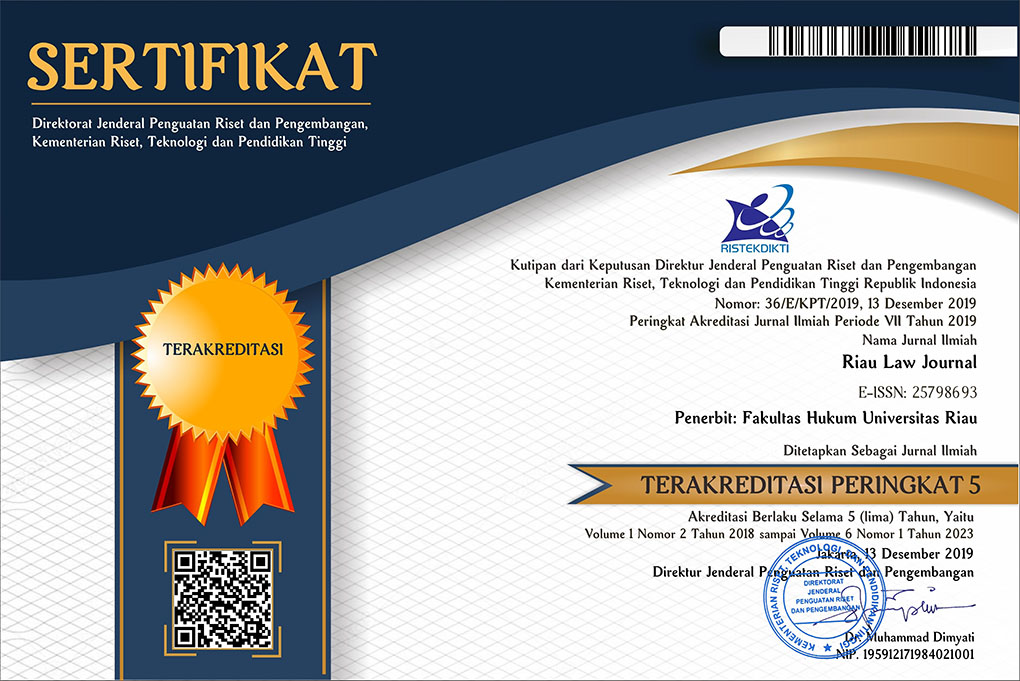THE CHARACTERISTIC OF SYAR’IYAH COURT DECISION INTO UNITARY STATE OF THE REPUBLIC OF INDONESIA ( SYAR’IYAH COURT REGIONAL CASES OF NANGGROE ACEH DARUSSALAM PROVINCE)
Abstract
The Sharia Court is a judicial institution within the scope of the Unitary State of the Republic of Indonesia which has important position in the Indonesian judicial system. The authority of the Syar'iyah Court is regulated through the Qanun of the Province of Nanggroe Aceh Darussalam (Article 1 point 15 of Law Number 11 of 2006 concerning the Government of Aceh). The limitations of the qanun that regulate the authority of the Sharia Court raises its own problems for judges to decide cases. Therefore, it is necessary to formulate and identify the characteristics of the decisions of the Sharia Court in the Province of Nanggroe Aceh Darussalam. This research is a normative legal research with a descriptive-analytic. The results show that the characteristics of the decisions of the Syar'iyah Court in the Unitary State of the Republic of Indonesia are in the form of the decisions of the Syar'iyah courts, the types of cases that are decided at the Syar'iyah courts, and on the basis of legal considerations in the decisions of the Sharia Courts. The characteristics of the decisions of the Sharia Court in these three aspects are not found in other court decisions in the Unitary State of the Republic of Indonesia. Jinayat cases are characteristic of the types of cases that are decided at the Sharia court. This type of Jinayat case shows the development of the concept of the Unitary State in the implementation of regional autonomy. The basis for legal considerations in the decision of the Sharia Court are facts (events and law), trial facts, sources of law and statutory regulations.
Full Text:
PDFReferences
Arfiani, et.al. “Penegakan Hukum Sesuai Prinsip Peradilan yang Berkepastian, Adil, dan Manusiawi: Studi Pemantauan Proses Penegakan Hukum Tahun 2020. Riau Law Journal. Vol.6. No.1.(2022): 48-74, http://dx.doi.org/10.30652/rlj.v6i1.7938.
Arifin, Bustanul. Alim Dalam Ilmu Hukum, Terampil dalam Melaksanakan Hukum,“ dalam buku Pelembagaan Hukum Islam di Indonesia: Akar Sejarah, Hambatan dan Prospeknya. Jakarta: Gema Insani Press, 1996.
Arto, Mukti. Praktek Perkara Perdata pada Peradilan Agama. Yogyakarta: Pustaka Pelajar, 1998.
Awaluddin,et.al. “Membangun Hubungan Ideal Mahkamah Agung dan Komisi Yudisial dengan Pendekatan Budaya: Sipakatau, Sipakalebbi, dan Sipakainge”. Riau Law Journa. Vol.6. No.1.(2022): 33-47, http://dx.doi.org/10.30652/rlj.v6i1.7912.
Braviaji, Ervianto. “Kewenangan Pengadilan di dalam Memeriksa dan Mengadili Sengketa Perbankan Syariah”. Jurnal Surya Kencana Satu: Dinamika Masalah Hukum dan Keadilan Vol.9. No.1. (2019): 69-89, http://dx.doi.org/10.32493/jdmhkdmhk.v9i1.1177.
Bisri, Cik Hasan MS. Peradilan Agama di Indonesia. Jakarta: Raja Grafindo Persada, 1998.
Brechin, Jessie. “A Study of the Use of Sharia Law in Religious Arbitration in the United Kingdom and the Concerns That This Raises for Human Rights”. Ecclesiastical Law Journal, 15(3, 2013): 293–315. https://doi.org/10.1017/S0956618X13000434.
Echols, John. M. dan Hasan Shadily. Kamus Inggris Indonesia. Jakart: PT. Gramedia, 1990.
Fadhli, Ashabul, & Arifki Budia Warman. “‘Alasan Khawatir’ pada Penetapan Hukum Dispensasi Kawin di Pengadilan Agama Batusangkar”. Al-Ahwal, 14(2, 2021): 146–158. https://doi.org/10.14421/ahwal.2021.14203.
Gunawan, Edi. “Peranan Pengadilan Agama dalam Pembaruan Hukum Islam di Indonesia”. Syariah: Jurnal Hukum dan Pemikiran Vol.16. No. 1. (2016): 77-86, https://dx.doi.org/10.18592/sy.v16i1.1432.
Harahap, M. Yahya. Kedudukan, Kewenangan dan Acara Peradilan Agama: Undang-Undang Nomor 7 Tahun 1989. Jakarta: Pustaka Kartini, 1993.
Hasanuddin, Muhammad. “Efektivitas dan Efisiensi Penyelesaian Sengketa Ekonomi Syariah di Peradilan Agama”. Mizani: Wacana Hukum, Ekonomi, dan Keagamaan Vol.7. No.1.(2020): 33-46, https://e-journal.iainptk.ac.id/index.php/khalrev/article/view/72.
Kamali, Mohammad Hashim. Actualization (Taf’il) of the Higher Purposes (Maqasid) of Shariah. Kuala Lumpur: International. Institute of Advanced Islamic Studies (IAIS), 2020.
Lubis, Nur Ahmad Fadhil. “Islamic Justice in Transition: A Socio-Legal Study of the Religious Courts, Judges in Indonesia”. Dissertation, University of California, Los Angeles, 1994.
Mu’allim, Amir Bin. “Yurisprudensi Peradilan Agama (Studi Pemikiran Hukum Islam di Lingkungan Pengadilan Agama Se-Jawa Tengah dan Pengadilan Tinggi Agama Semarang, 1991 - 1997)”. Disertasi, UIN Sunan Kalijaga Yogyakarta, 2003.
Mudzhar, M. Atho. Pendekatan Studi Islam dalam Teori dan Praktek. Yogyakarta: Pustaka Pelajar, 2004.
Nasution, Khoirudin. “Women’s Right in the Islamic Family Law of Indonesia”. Unisia, 28(56, 2005), 192–204. https://doi.org/10.20885/unisia.vol28.iss56.art10.
Nurhadi. “Penegakkan Hukum Jinayat di Provinsi Aceh: Problematika dan Tantangan, Cakim Pengadilan Agama Tigaraksa Sejak Mei 2009-November 2011”. Badilag.net, 2011. www.badilag.net/.../PENEGAKAN%2520HUKUM%2520JINAYAT%2520DI%2520PROVINSI%25...%0A%0A
Oslami, Achmad Fikri. “Wewenang Mahkamah Syar’iyah Dalam Pemeriksaan Praperadilan”. Legitimasi: Jurnal Hukum Pidana dan Politik Hukum. Vol.11. No.1. (2022): 135-147, http://dx.doi.org/10.22373/legitimasi.v11i1.11874.
Ritonga, Iskandar. “Hak-Hak Wanita dalam Hukum Kekeluargaan Islam di Indonesia (Implementasinya dalam Putusan-Putusan Peradilan Agama DKI Jakarta, 1990-1995)”, Dissertation, UIN Syarif Hidayatullah Jakarta, 2003.
_________________. Mahkamah Syar’iyah di Nanggroe Aceh Daarussalam dalam Perundang-Undangan dan Qanun, Padang: Suluh Pers, 2004.
_________________. Hak-Hak Wanita Dalam Putusan Peradilan Agama. Jakarta: Ditjen Bimas Islam dan Penyelenggaraan Haji, 2005.
Sufiarina. “Urgensi Pengadilan Agama sebagai Penyelesaian Sengketa Ekonomi Syariah”. Jurnal Hukum dan Pembangunan Vol. 44 No.2. (2014): 226-244, http://dx.doi.org/10.21143/jhp.vol44.no2.21.
Sulaeman, Syamsir. “Capaian Mahkamah Syar’iyah Aceh Tahun 2011 Hambatan Dan Tantangan Dalam Pelaksanaan Tugas Serta Proyeksi Tahun 2012”. 2011. https://www.ms-aceh.go.id.
DOI: http://dx.doi.org/10.30652/rlj.v7i1.8073
Refbacks
- There are currently no refbacks.
Riau Law Journal has been indexed by:
|










